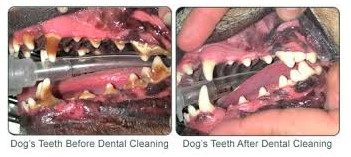November Blog
Periodontal Disease
Did you know?
Periodontal Disease is the most common disease in companion animals. This is simply because we cannot take care of our pets’ mouths the same way we do of our own. The result is the accumulation of sticky bacterial-laden plaque on the teeth and at the gumline that rapidly mineralizes to form calculus. Overtime, the result is halitosis (bad breath), gingivitis (inflammation of the gingiva), recession of the gingiva, jaw bone loss and abscess formation at the tooth roots. The latter necessitate tooth extraction. Occasionally, periodontal disease can affect a pet’s systemic health.
Periodontal Disease is the most common disease in companion animals. This is simply because we cannot take care of our pets’ mouths the same way we do of our own. The result is the accumulation of sticky bacterial-laden plaque on the teeth and at the gumline that rapidly mineralizes to form calculus. Overtime, the result is halitosis (bad breath), gingivitis (inflammation of the gingiva), recession of the gingiva, jaw bone loss and abscess formation at the tooth roots. The latter necessitate tooth extraction. Occasionally, periodontal disease can affect a pet’s systemic health.

How often does your dentist recommend a cleaning and dental x-rays? Twice annually is the standard. Believe it or not, the American Veterinary Dental College recommends annual cleanings and imaging in veterinary patients. They also recommend regular tooth brushing used in combination with more passive dental interventions such as certain diets, treats, water additives, topical agents, etc. As with many over-the-counter products, the big question is WHAT WORKS? We suggest consulting the Veterinary Oral Health Council’s website for a comprehensive list of validated products: www.vohc.org.
If you suspect your pet has periodontal disease, please ask us. We are happy to discuss your pet’s dental health in further detail, including the logistics of a COHAT, as well as provide you further information about preventative dental care. For puppy and kitten owners, the time to start home dental care is after that 6 month spay/neuter visit when your pet can more easily be conditioned and when the adult dentition is fully erupted.


